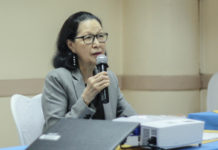UST RECTOR Fr. Herminio Dagohoy, O.P. cautioned against lowering the age of criminal liability to 12 years old from 15, saying children should be educated, not imprisoned.
In his homily during the University Mass for the feast of St. Thomas Aquinas on Jan. 25, Dagohoy said children should be seen in schools and playgrounds, where they belong.
“[A]ng mga bata saan dapat makikita? Sa tamang lugar: sa eskuwelahan, sa laruan, hindi sa kulungan. Kapag nilagay mo sa kulungan [ang mga] ‘yan, tama ba ‘yon?” he said.
Actions that are not in line with the heart and mind are “sinful,” which, he said, is what a number of politicians have become.
“Iba ‘yong sinasabi, iba ‘yung ginagawa. Sumasala. Iba ‘yung sinasabi, hindi malinaw sa ginagawa. Hindi maganda,” he said.
On Jan. 23, the House of Representatives approved on second reading a bill that seeks to lower the age of criminal liability to 12 years old instead of nine, as proposed originally.
House Bill 8858 seeks to amend Republic Act (RA) 9344 or the Juvenile Justice Welfare Act of 2006, which set the minimum age of criminal liability at 15 years old.
Oriental Mindoro Rep. Salvador Leachon, chairman of the House Committee on Justice, has clarified that children would be put in “reformative institutions” and not prisons.
Under the measure, children above 12 years old but under 18 will be subjected to an intervention program and exempted from liability unless the minor “acted with discernment.”
‘Not justified’
Dagohoy urged lawmakers to rethink their plan and scrutinize the bill carefully, warning that the legislation might not serve its intended purpose. He added that the proposal should be backed up by a scientific study that will look at its possible consequences.
“We recognize the situation, the gravity of criminality happening in the country, but we have to ask ourselves whether such kinds of policies would really address the issue,” he told the Varsitarian in a chance interview.
Lawyer Kath Panguban of the National Union of People’s Lawyers said the legislators are using the bill as a “face-saving measure” as they could only go after the children and not the adult criminal offenders and syndicates.
“Sinasabing the children are used and exploited by adult crime offenders or syndicates para gumawa ng krimen so kung ganun ‘yong rationale nila, why don’t go after these syndicates, these adult offenders who as they claim are exploiting children sa paggawa ng krimen?” she said in a phone interview.
She also slammed the “unclear” working definition of the term “rehabilitation” in the proposed measure, saying it could be subject to misuse and abuse in the future.
Under RA 9344, children may be rehabilitated through diversion or intervention. A diversion program refers to the program that the child in conflict with the law, aged 15 to 18, is required to undergo after he is found to have acted with discernment for a crime without the need to resort to formal court proceedings.
The intervention program refers to a series of activities that are designed to address issues that caused the child, aged 15 and below, to commit an offense. It may include counseling, skills training and educational activities for the child’s psychological, emotional and psychosocial well-being.
“Sa punto de bista namin, kapag ang mga batas na pinaguusapan natin ay involved ang mga bata, wala dapat na vague terms… Isa ‘yan sa mga binibira namin ngayon sa panukala,” she said.
Panguban stressed the importance of releasing a child who committed an offense aged 15 below to his parents, nearest relative or guardian to “lessen the displacement” in their communities.
“For children below the minimum age of criminal liability, [intervention is necessary] para ma-assess ano ang mga risk factors bakit siya nakasama doon sa isang krimen. Ganon din ang maga-apply kahit 16 years old to 18, [they are] subject to diversion programs,” she said.
In a statement, the UST Volunteers for the United Nations International Children’s Emergency Fund (UST-Unicef) called the bill “ironic and hypocritical” for violating a child’s rights.
Although the bill promises to put children in “intervention facilities,” the organization pointed out that the country lacks resources.
UST-Unicef said children in conflict with the law were merely exploited by adult criminals, making them “victims of circumstances and environment rather than mere perpetrators of crime.”
“Lowering the age of criminal liability not only disregards the fact that children at that age are still not mature enough. It also makes younger children vulnerable targets of crime syndicates and other violators of children’s rights,” the statement read.
Lack of rehabilitation facilities
The law needs to be amended, but the age of criminal liability must still be at 15 years old, said lawyer Antonio La Viña, former dean of the Ateneo School of Government.
La Viña said only few fully operational “Bahay Pag-asa” or rehabilitation centers around the country could facilitate the needs of children in conflict with the law.
“[The law] needs to be amended to provide more facilities, to take care of those children… but it doesn’t have to make them criminals. By making them criminals, they would be treated [as] adults when they are not,” he said in a chance interview.
He said children should be separated from adult criminals even in rehabilitation facilities.
But for Panguban, the current Juvenile Justice and Welfare Act is a “huge advancement” for children’s rights. The law, however, is not properly implemented due to the lack of budget allocation.
“Wala ngang budget na inilalaan para doon sa Bahay Pag-asa, sa pag establish nila ng restorative justice system for the children. ‘Yon ‘yong need [unahin] e… tapos kating-kati na sila pababain ‘yong criminal age of liability,” she said.
Only 55 “Bahay Pag-asa” centers are currently operational out of the 113 required by the law, the Senate Committee on Justice revealed in a committee hearing last Jan. 25.
It was only in 2013 that the Juvenile Justice and Welfare Center received the P400-million budget for the creation of the rehabilitation centers.
President Duterte wants to lower the age of criminal responsibility, arguing that offenders have been using minors as accomplices and drug couriers to escape prosecution.



















